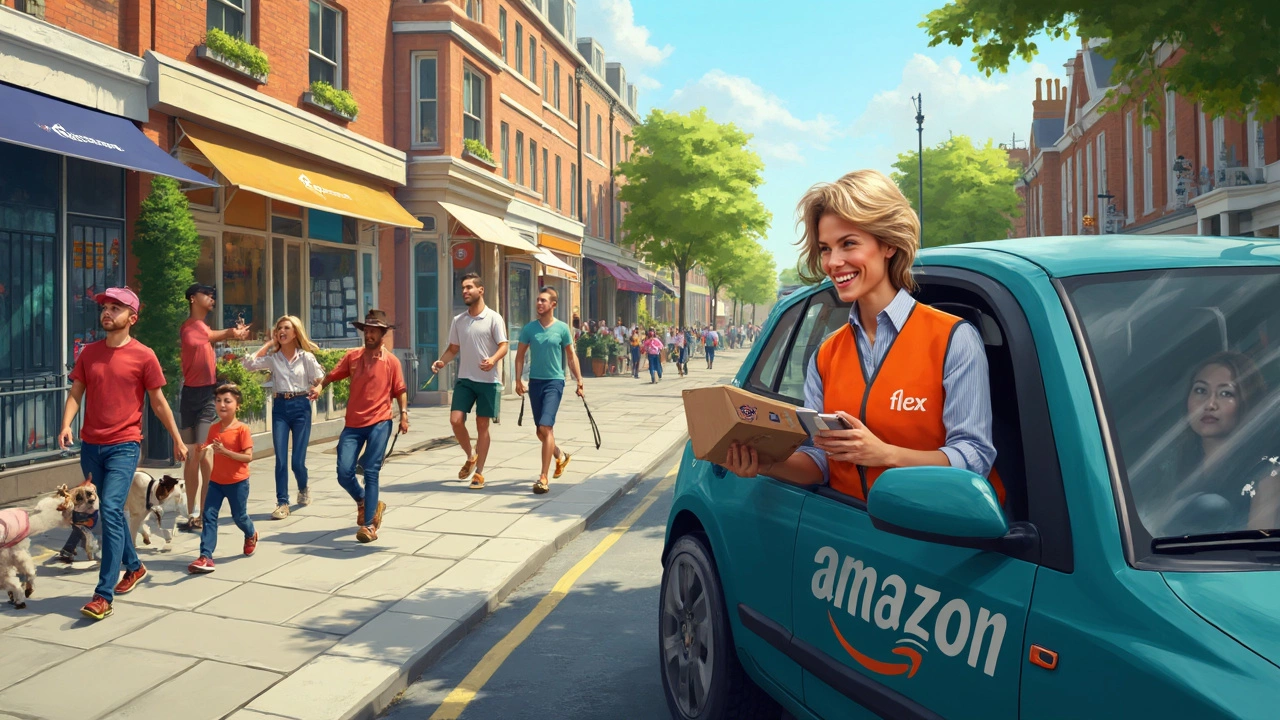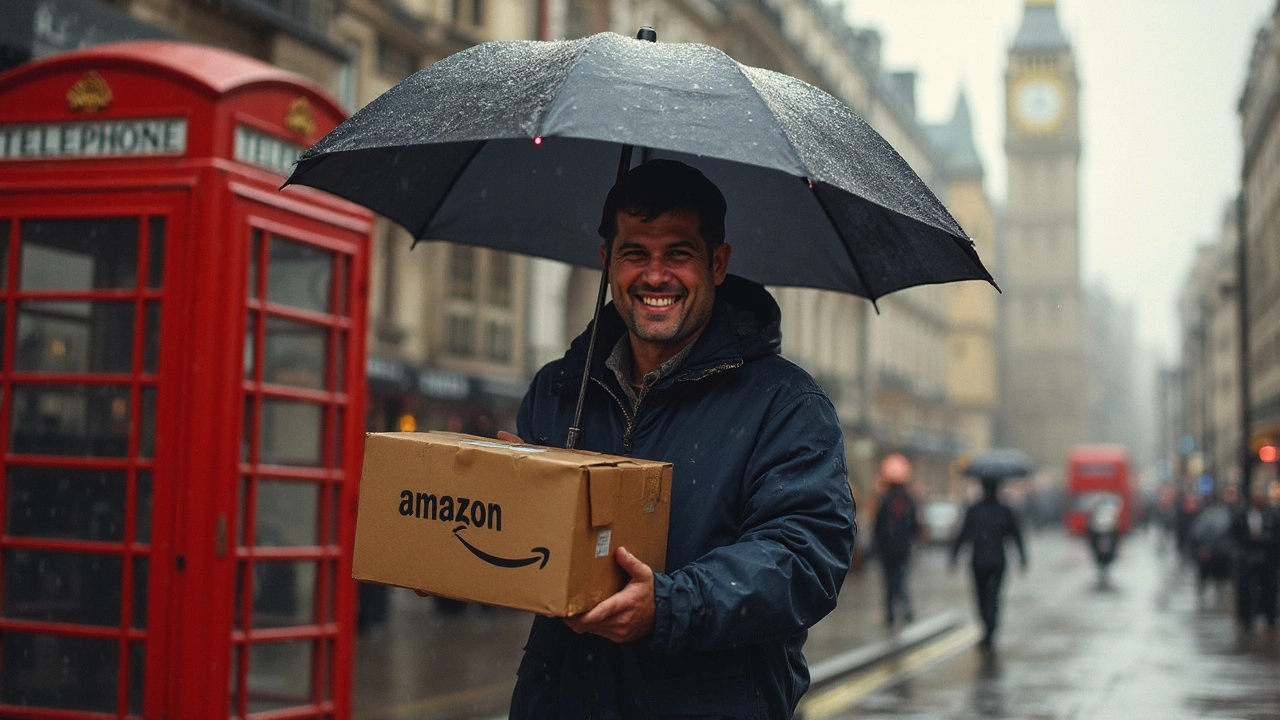Can You Really Make $1,000 a Week with Amazon Flex?

So, you're thinking about diving into the gig economy and making some extra cash? Amazon Flex might just be the opportunity you’re looking for. But can you really bring in $1,000 a week?
Driving for Amazon Flex involves delivering packages to customers using your own vehicle. It offers a flexible schedule, allowing you to swap rigid office hours for something that fits your lifestyle. But what about the money part—how does it add up?
- Understanding Amazon Flex
- Earnings Potential
- Tips for Maximizing Earnings
- Driver Requirements
- Realities of the Job
Understanding Amazon Flex
If you're keen on joining the gig economy, Amazon Flex could be a good move. Like rideshare opportunities, it lets you be your own boss and set your own hours, just with packages instead of people.
Amazon Flex is a delivery program where drivers, known as 'delivery partners', use their vehicles to deliver Amazon packages. It's available in more than 50 cities across the U.S., and you can sign up through the Amazon Flex app. The idea is simple: claim delivery shifts on the app, pick up the packages at an Amazon warehouse, and then hit the road.
What can you expect as a driver? According to Amazon, drivers can earn between $18 to $25 per hour. However, how much you make really depends on the area you're delivering in and the tips you might receive.
"Amazon Flex offers drivers unique opportunities to increase their earnings potential while maintaining the flexibility needed to meet their personal needs." – Forbes
Let's break down what makes Amazon Flex unique:
How It Works
- Download the Amazon Flex app and create an account.
- Submit necessary documents like your driver's license and insurance details.
- Select your available blocks (shifts) on the app.
- Show up at the designated Amazon dispatch location, load your car, and start delivering packages.
Flexibility is the name of the game here. You can pick up as many shifts as you want (or skip some) depending on your schedule. But remember, during peak seasons like the holidays, there's a bit of a rush and blocks can go quickly. Pro tip: Be ready a few minutes before blocks open up.
Being aware of your vehicle’s maintenance and fuel costs is key since they come out of your pocket. It's crucial to decide if Amazon Flex aligns with your financial and personal goals. It's not just extra cash; it's about the control of when and how you earn.
Earnings Potential
Now, let’s get to the meat of the matter—how much can you earn as an Amazon Flex driver? Well, the numbers can vary a bit depending on where you live and how many hours you put in.
On average, drivers report earning between $18 and $25 per hour, which is pretty decent for gig work. But here's where it gets interesting—your ability to hit that magic number of $1,000 a week largely depends on the hours you work and the demand in your area.
Calculating Weekly Earnings
To hit $1,000 a week, you’d be looking at working around 40 to 55 hours per week if you're in a good area with steady demand. Here's a quick breakdown of how your earnings might stack up:
| Hourly Rate | Weekly Hours | Weekly Earnings |
|---|---|---|
| $18 | 55 | $990 |
| $25 | 40 | $1,000 |
Keep in mind, these figures are before expenses like gas, tolls, and wear and tear on your vehicle—which can eat into your profits. So it'd be smart to keep an eye on those costs.
Boosting Your Earnings
Now, to maximize your earnings, it's all about knowing when and where to work. The best times to grab lucrative deliveries usually fall during lunch and evening rush hours or on weekends when everyone’s doing online shopping.
- Keep an eye out for surge pricing—higher payout rates occur when demand is high.
- Block grabbing—reserve your delivery blocks ahead of time to ensure a steady flow of work.
- Be efficient—less time means more deliveries, and that usually equals more money.
The more strategic you are about your work schedule, the better chance you have of boosting that paycheque.

Tips for Maximizing Earnings
Want to make the most out of your time driving for Amazon Flex? Here are some tips to boost your earnings effectively.
1. Choose the Right Blocks
Not all delivery blocks are created equal. Keep an eye out for blocks that offer higher pay. Sometimes, these are during peak hours or when demand surges, like after a holiday or during sales events. Don’t be shy about grabbing those blocks quickly, as they tend to disappear fast.
2. Optimize Your Route
The faster you deliver, the more blocks you can fit into your schedule. Use navigation apps that offer real-time updates to avoid traffic and find the quickest routes. A little planning can save you loads of time.
3. Track Your Expenses
Since you’re using your vehicle, keeping track of mileage, gas, and wear-and-tear is crucial. Some drivers reduce their taxable income by claiming these as business expenses. Consider using an app to simplify this process.
4. Aim for Tips
You'd be surprised how often a friendly smile and prompt service can lead to tips from happy customers. While not every delivery will result in extra cash, keeping customer service in mind can boost your earnings over time.
5. Stack Incentives
Watch for incentives Amazon offers from time to time, like bonuses for completing a certain number of blocks within a specified period. These can significantly increase your paycheck.
Sample Earnings Table
Check out this sample earnings table, which shows potential earnings based on shifts:
| Type of Shift | Hours Worked | Estimated Earnings |
|---|---|---|
| Regular Weekday | 4 | $72 - $96 |
| Weekend Peak | 4 | $100 - $140 |
| Bonus Block | 5 | $125 - $175 |
Following these tips can help you inch closer to that $1,000 a week goal. Remember, being strategic about your time and keeping track of your expenses can make a big difference in your overall earnings.
Driver Requirements
Before getting behind the wheel with Amazon Flex, there are a few things you need to have sorted out. Let's break it down so you know exactly what’s needed to get started on your journey as an Amazon Flex driver.
Vehicle and License
First up, you'll need a reliable vehicle. Most standard sedans, compact to full-size, work well, although larger vehicles like SUVs and trucks can hold more packages—which might mean more money. Make sure your vehicle is insured and registered.
Also, you’ll need a valid driver’s license. Seems obvious, right? But make sure it's up-to-date and issued by the state you’ll be delivering in.
Smartphone Requirements
The Amazon Flex app is your working buddy, guiding you through routes and deliveries. You'll need a smartphone with Android 6.0 or newer, or an iPhone that runs iOS 13 or higher.
Background Check
A background check is part of the process, so expect Amazon to take a look into your driving record and any criminal history. This is to ensure the safety of everyone on the road and the customers you’ll be delivering to.
Age and Eligibility
You must be at least 21 years old. On top of that, it's crucial that you're eligible to work in the US. Getting your tax ducks in a row from the start is smart, considering this is an independent contractor role.
Once you’ve got these all covered, you're well on your way to hitting the road and potentially making that coveted $1,000 a week!

Realities of the Job
Working as an Amazon Flex driver isn't just about hitting the road and making fast cash. There's a day-to-day reality that could make or break your experience. Let’s dive into some specifics.
Time Management is Key
While the flexibility is great, managing your time becomes crucial. You have the freedom to choose delivery blocks, but you’ve got to be economical with your time, especially during peak hours. Late nights and weekends might be your most profitable opportunities. So, having a strategy for block grabbing can maximize your earnings.
Wear and Tear on Your Vehicle
Delivering packages means miles and miles on your own car, so think about the maintenance costs. Regular oil changes, tire rotations, and other upkeep activities should be budgeted in. Don’t forget to keep track of these expenses for tax deductions.
Customer Interaction
While most jobs involve relatively little human interaction, hitting the right door and handling packages appropriately is key. A friendly face is always welcome, but remember that you'll mostly be on your own, navigating streets and sometimes tricky driveways.
Understanding the Compensation Structure
Amazon Flex pays by the block—usually in the $18 to $25 range per hour. This rate includes your driving time and any waiting time. However, if you finish your deliveries early, you still get the entire block pay. On the flip side, if it takes longer than expected, you won't earn extra for that time.
Some drivers report earning more on average during the holiday season, when demand spikes.
Possible Downsides
Be prepared for unpredictability in several aspects of the job. Block availability can be inconsistent, and areas of service might vary. Bad weather or unexpected traffic can also impact your deliveries and stress levels. Here’s a little breakdown:
| Challenge | Impact |
|---|---|
| Block Availability | Inconsistency can affect earnings. |
| Traffic/Weather | Delays your schedule. |
| Vehicle Maintenance | Extra costs and planning needed. |
These are just some realities. Getting into the delivery driver mindset can prepare you for a job that's rewarding but requires persistence and strategic planning.